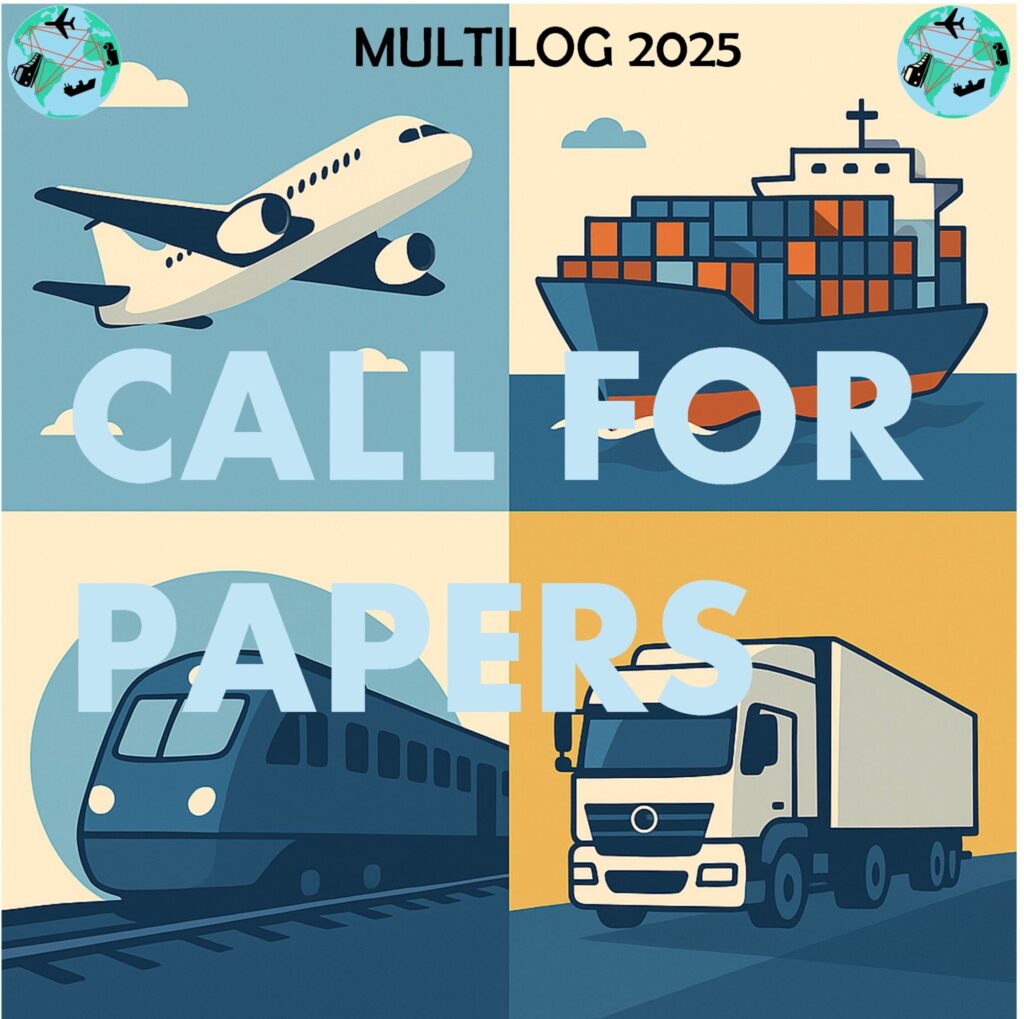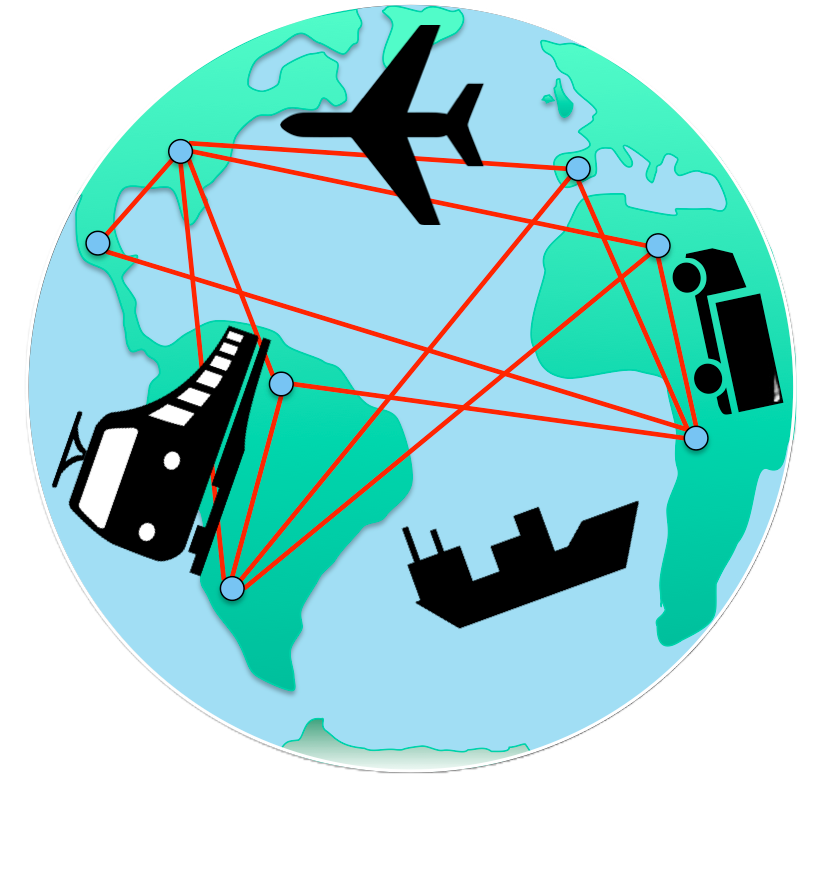
MULTILOG 2025
Connected Corridors in a Fragmented World
Dec 11 – 12, 2025
Universidad del Mar, Puerto Escondido, Mexico
In an era marked by geopolitical tensions, climate urgency, and growing inequality, the demand for more efficient and sustainable cargo and passenger transport systems has never been greater. The fragmentation of global supply chains and regional imbalances challenges the very foundations of mobility, logistics, and transport. Against this backdrop, intermodal transport offers a promising pathway forward—leveraging the strengths of different transport modes within integrated, connected corridors to enhance both system efficiency and environmental performance. This year’s conference focuses on how multimodal and intermodal solutions can bridge divides—geographical, economic, and infrastructural. Emphasis will be placed on developing sustainable and resilient transport networks capable of adapting to disruptions while promoting equitable access. The complexity of these challenges calls for a holistic approach, combining scientific research with technical innovation, policy development, and economic analysis. Key barriers remain, including poor interconnectivity, fragmented governance, modal competition, and the lack of harmonized safety and security standards. Addressing these requires collaboration across disciplines and sectors. We invite researchers and industry experts to submit papers that explore innovative solutions to these challenges, with special attention to supply chain. As global concern rises over disrupted supply chains and unequal distribution of resources, this conference provides a platform to debate how connected corridors can help reshape mobility in a divided world.
Authors are welcome to submit their contributions to the following, but not limited to areas such as:
- Transport Policies
- Multimodal cargo and passenger transport
- Multimodal transport in developing and emerging countries
- Operational research in multimodal transport and heuristics
- Changes in methods for freight movement and delivery
- Methods for travel delay reduction
- Human behaviour in transport
- Synchromodality and sustainability in logistics
- New technologies for design, construction, operation and maintenance of transport infrastructure
- The use of big data, ML or AI in transport analytics and safety improvements
- Telecommunications and energy management in multimodal Transport
- and more.
Paper deadlines and requirements:
The congress encourages researchers and practitioners to submit their original contributions in the form of:
- Full paper, (max 8 pages); peer-reviewed; accepted for presentation; published in the Congress proceedings; considered for journal publication.
- or Extended Abstract of 1 page including the objective, methods and conclusions; however, upon acceptance, the authors are required to submit the full paper by the camera-ready deadline.
Instructions, information, submission forms, and procedures are available on the MULTILOG 2025 website. Each accepted contribution requires a paid registration.
Paper templates are here:
Word Template ……………….. LATEX Template
and submission instructions are available HERE
Important dates:
MULTILOG Conference 2025: 11-12 December 2025
Extended abstract/ Full paper submission deadline: 15 October 2025–31 October (extended Deadline)
Notification of acceptance: 31 October 2025—7 November (extended Deadline)
Camera-ready paper submission deadline: 21 November 2025
Early bird registration deadline: 14 November 2025
Last call for registration deadline: 6 December 2025
Proceedings and journal opportunities:
All accepted full papers will be included in the Multilog Congress 2024 proceedings; outstanding papers will be invited for submission to one of the journals affiliated with the MULTILOG Conference 2024::
– Computers and Industrial Engineering
-Simulation Notes Europe
– SIMULATION: Transactions of the Society for Modeling and Simulation International
– Case Studies on Transport Policy
Selected papers can also be submitted in an extended form as a book chapter for the new volume of Applied Simulation and Optimization 3: New applications in Logistics, Industrial and Aeronautical Practice, to be published by Springer.
Conference Board:
General Chairs:
Dr. Idalia Flores, UNAM
Dr. Rosario Enriquez, Universidad del Mar
Program Chairs:
Dra. Alejandra Menendez , UMAR
Scientific Committee:
Dr. Salvador Hernández González, Tecnológico Nacional de México en Celaya, Mexico
Dr. Miguel Mujica Mota, Amsterdam University of Applied Sciences, The Netherlands
Dr. Juan Meraz, Universidad del Mar, México
Dr. Paolo Scala, FEDEX EUROPE
Dr. Edgar Possani, Technological Institute of Mexico, Mexico
Prof. Adriano Solis, York University, Canada
Dr. Antonio Padovano, University of Calabria, Italy
Dr. Bogusz Wisnicki, Scezin Maritime University, Poland
Dr. Emanuel Merchan, TSI, Latvia
Prof. Alejandro DiBernardi, University of La Plata, Argentina
Dr. Abdel El Makhloufi, Amsterdam University of Applied Sciences, The Netherlands
Dr. Vasco Reis, Instituto Superior Técnico, Portugal
Dr. Alejandro Murrieta, Amsterdam University of Applied Sciences, The Netherlands
Dr. Antonella Petrillo, Parthenope University of Naples, Italy
Dr. Sofia Kalakou, ISCTE Business School, Portugal
Dr. Susana Casy Tellez Ballesteros, UNAM, México
Dr. Darren Ellis, Cranfield University, England
Dr Sanja Lazaronova Molnar, Karlsruhe Institute of Technology, Germany
Dr. Jenaro Nosedal, Universidad de las Americas Puebla, México
Msc. Angel Orozco, International Airport of Mexico
Dr. Luis Martin Domingo, Dublin City University, Ireland; and Ozegin University, Turkey
Prof. Marina Efthymiou, Dublin City University
Dr. Richard Wu, New SouthWales University, Australia
Prof. Ashish Verma, Indian Institute of Science, Bangalore, India
Prof. Miquel Angel Piera, Autonomous University of Barcelona, Spain
Dr. Idalia Flores, UNAM, México
Prof. Jorge Luis Garcia Alcaraz, Universidad Autónoma de Ciudad Juarez, México
Dr. Jorge Ochoa, Universidad del Mar, México
Dr. Geoffrey Scozzaro, ENAC, France
Dr. Edgar Jimenez, Cranfield University, UK
Dr. Mohammad Dehghani, Northeastern University, USA
Dr. Ricardo Torres, UNAM, México
See the full list here
